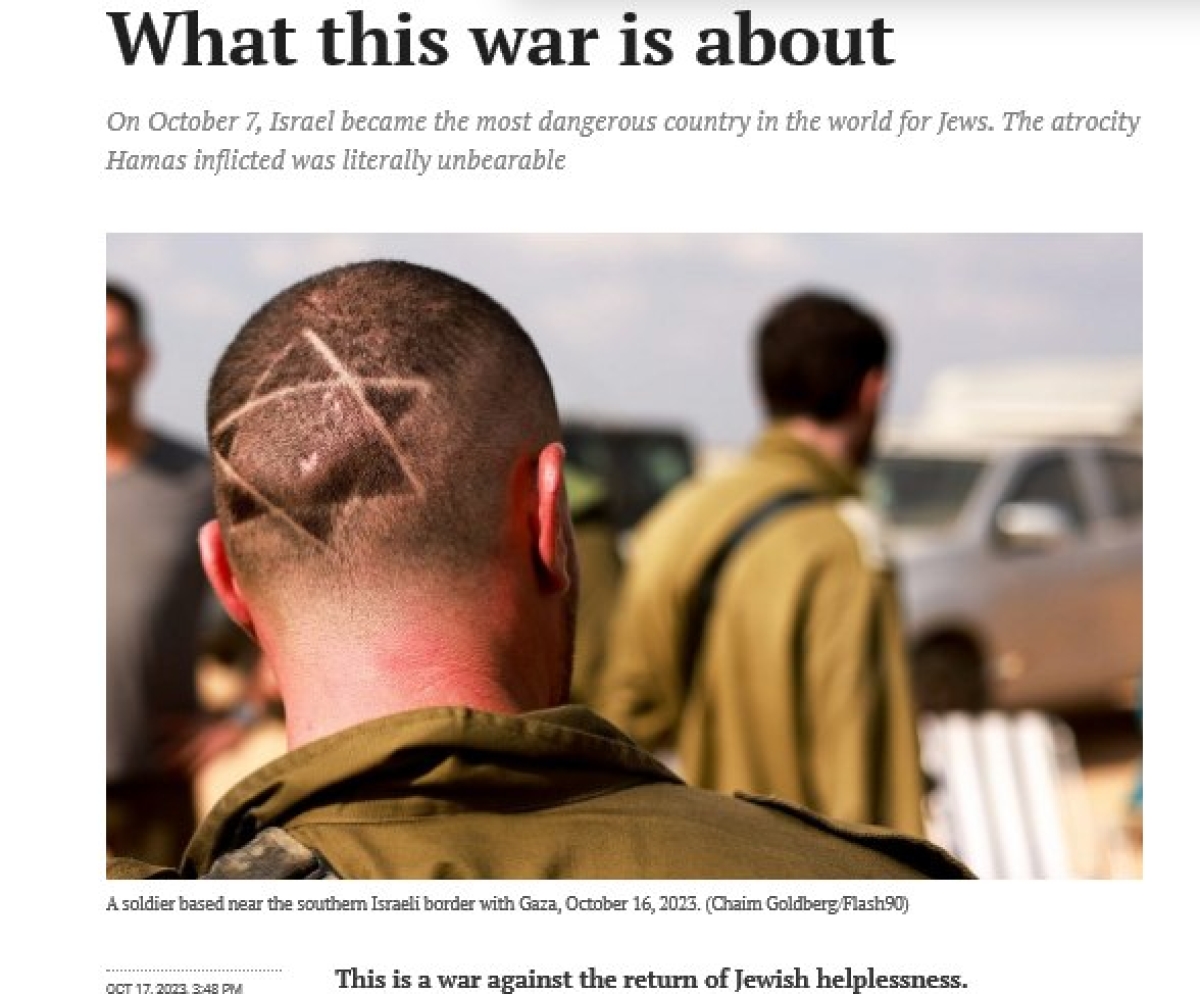'Worum es in diesem Krieg geht'

Das popgramartige Massaker der Hamas vom 7.10 war der größte antisemitische Massenmord seit 1945. Das hat weitreichende Folgen für die israelische Gesellschaft.
In einem längeren Essay analysiert Yossi Klein Halevi, was die Massaker der Hamas für Folgen für die Menschen in Israel hat und was es von anderen Terroranschlägen in der Vergangenheit grundlegend unterscheidet.
Die Lektüre des ganzen Artikels, von dem einige Auszüge im folgenden zitiert werden, sei jedem ans Herzen gelegt:
"I don’t need Auschwitz to motivate me to defend myself against Hamas, I replied. I live in the Middle East; the fate of the Yazidis is more relevant to me than Babyn Yar. Nor do I trust European sympathy for Israel that is based on the Holocaust. That support is unstable; today it is applied to dead Jews, tomorrow to dead Palestinians. (...)
We are not engaged with the Palestinians in a competition for victimhood. The Palestinians will always win that competition, and rightly so. In opting for power, the Jewish people opted out of the victimhood competition. There is a price to pay for the loss of innocence. We have no choice but to own it. (...)
At no time in Israeli history, including the first catastrophic days of the Yom Kippur War, has our military credibility been so undermined. Hamas’s blow was devastating precisely because it was the weakest of our enemies – and because the army failed so miserably, not only to preempt the attack at the border but to stop the atrocities as they were happening, effectively abandoning the towns and kibbutzim to their fate. (...)
This has never been the “Israeli-Palestinian” conflict alone. For most of the last 75 years of Israel’s existence, it was the Arab-Israeli conflict.
In recent years, the Arab-Israeli conflict has been supplanted by the radical Shiite-Israeli conflict. Like the Arab world a generation ago, the radical Shiite axis is committed to Israel’s destruction. To focus only on the fighting in Gaza is to misunderstand what is happening there. This is war with Iran by proxy.
In what may once have been a marriage of convenience, Hamas, the only Sunni component of the Iranian alliance, has embraced the theological agenda of the Iranian Revolution and its quest for regional hegemony. (...)
The massacre marks a turning point in our war with the radical Shiite axis. For now, Iran is winning. (...)
One of the most devastating moments for me in the aftermath of the massacre was a televised interview with the father of a murdered young woman. “The people of Israel is amazing,” he said. “But I’m finished with the state.”
Israelis have never gone to war so lacking in faith in their leaders. Israelis were bitterly divided during the 1982 Lebanon War. Yet no one seriously doubted that Menachem Begin and Arik Sharon were doing what they believed was best for Israel, that they put Israel’s interests ahead of their own.
For a large part of the Israeli public, that is hardly the case today. We have never experienced anything like this: a prime minister, in time of war, who is afraid to mingle with the troops because of the outrage he is likely to encounter.
Astonishingly but not surprisingly, the government’s abandonment of the south persisted even after the massacre. The state has been criminally ineffective in dealing with the basic needs of the survivors. That incompetence is a direct result of this government, which has systematically replaced professional civil servants with political hacks, undoing decades of reform in the civil service.
Responsibility for the survivors was assumed by the activists of the democratic protest movement – those whom this government labeled as traitors.
This is the war of a leaderless people taking responsibility for itself. Our great achievement in the aftermath of the massacre was the way that Israeli society, entirely motivated from the bottom up, effectively mobilized itself. Many reservists didn’t wait to be called up; civilians overwhelmed the blood banks with donations.
Dissonance is built into the Israeli reality, and no moment is more dissonant than now. The paradox of this war is that, while the distrust and contempt for our leaders has never been higher, neither has our morale, our love of country, our readiness to sacrifice, even our ability to unite. (...)
The fatal miscalculation of Israel’s enemies is that they mistake Israel for a rootless colonial project that will go the way of Rhodesia and white-ruled South Africa. Inflict enough atrocities and the Jews will flee “back to Poland.” (Palestinian apologists never say, “back to Iraq, back to North Africa,” which is where a majority of Israeli Jews come from.)
A colonialist state would have long since become fatally demoralized and surrendered to the relentless terrorism and war and siege. But enmity has only made Israel stronger, because its people are home. Now our enemies have united us – this time, inducing in a single day the miraculous turn-around of a nation so divided we seemed on the verge of civil war, to a nation defined once again by shared purpose and effort. (...)
To win this war against evil requires steadiness and balance. Leftwing Jews need to understand that the Jewish people cannot afford the purity of powerlessness, while rightwing Jews need to understand that power requires moral limits. As a people, we must not be indifferent to the anguish of Gaza. And we must not allow that anguish to undermine our resolve to destroy Hamas.